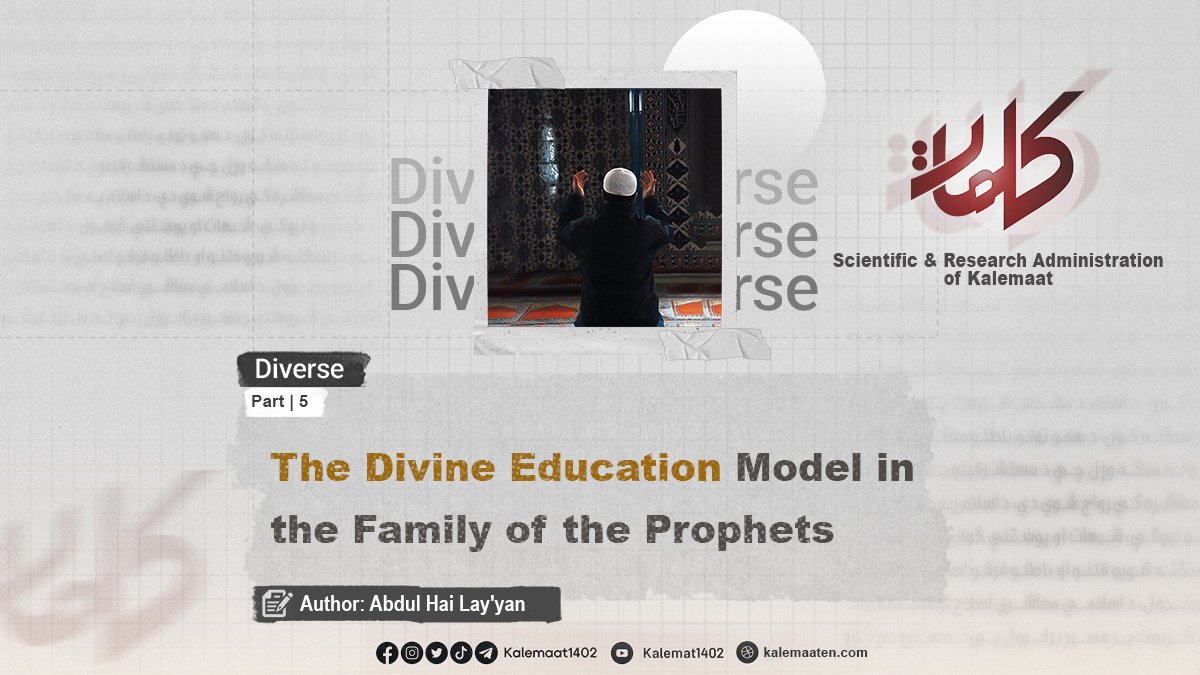Author: Abdul Hai Lay'yan
The Divine Education Model in the Family of the Prophets (Part Five)
Educational Teachings of the Story of Adam (PBUH)
The story of Prophet Adam (PBUH) is one of the most fundamental stories in the Quran that has been presented in numerous verses of the Holy Quran, with a diverse and multi-layered expression. This story is not simply a report of a historical event; rather, it is a platform for explaining the deepest anthropological, epistemological, moral and educational concepts. In fact, the Quran, with the story of the creation of Adam (PBUH), his test, the divine command, the temptation of Satan, the fall from Paradise, the acceptance of repentance and the beginning of earthly life, outlines a comprehensive structure of the process of human education that plays a special role not only in individual education; but also in the institutionalization of family and social education. Some of the important teachings of this story are explained below.
The First Teaching: The Equality of Men and Women in Humanity
The creation of Eve, in the ways explained in detail in the previous story, reveals two fundamental points to us:
1. The equality of men and women in human nature and the intrinsic value of humanity. In this regard, Allah Almighty says: «یَا أَیُّهَا النَّاسُ اتَّقُوا رَبَّکُمُ الَّذِی خَلَقَکُم مِّن نَّفْسٍ وَاحِدَةٍ» Translation: “O mankind! Fear your Lord, who created you from a single soul.” [1]
This verse clearly emphasizes the commonality of man and woman in the origin of creation and the similarity of their human essence.
2. The equality of the two in human kinship. The woman is considered the sister of the man, because both are attributed to the same father and mother. Allah says elsewhere: «یَا أَیُّهَا النَّاسُ إِنَّا خَلَقْنَاکُم مِّن ذَکَرٍ وَأُنثَى» Translation: “O mankind! We have created you from a male and a female.” [2] The address “O mankind,” which includes all human beings, both men and women, is a testament to the fact that both sexes are equal and compatible in human lineage. The Prophet, peace and blessings of Allah be upon him, has also confirmed this equality in valuable hadith: «النِّسَاءُ شَقَائِقُ الرِّجَالِ»Translation: Women are the complementary halves of men (they are the equals of men). [3]
This bond of brotherhood and sisterhood requires the equality of men and women in all rights related to lineage, inherent and human dignity. [4] None of them is superior to the other, as the Holy Quran states in its statement of the general dignity of human beings: «وَلَقَدْ کَرَّمْنَا بَنِی آدَمَ» Translation: “And indeed, we have honored the children of Adam.” [5]
This divine dignity is not specific to a particular gender, and men and women equally benefit from this divine gift.
The Second Teaching: The High Position of Women in Islam and Islamic Society
In the Islamic intellectual system, women enjoy a high status and dignity that both preserves their inherent dignity and establishes their position in the structure of the family and society. This high position can be analyzed from several aspects:
1. Preserving the dignity and chastity of women
The creation of Eve from the flesh of Adam (PBUH) not only indicates the inseparable bond between men and women; it also emphasizes the need to protect women’s chastity and honor. Referring to this special creation, the Holy Quran calls upon men to protect this precious gem: «وَخَلَقَ مِنْهَا زَوْجَهَا» Translation: “And from him He created his mate.” [6] This verse shows that women are the embodiment of mercy and companionship and should be nurtured like a flower in the safe confines of the family.
2. Women; a divine blessing for men
The creation of women is a blessing for which men should be grateful to Allah. The Prophet Muhammad (peace and blessings of Allah be upon him) said in a hadith: «مَا أَکْرَمَ النِّسَاءَ إِلَّا کَرِیمٌ، وَلَا أَهَانَهُنَّ إِلَّا لَئِیمٌ» Translation: “No one honors women except a noble man, and no one humiliates them except a mean man.” [7]
This divine blessing places certain responsibilities on men, including protecting women’s privacy, ensuring their mental and physical safety, and avoiding any kind of oppression and aggression.
3. Strict prohibition for harassment of women
The Holy Quran explicitly condemns harassment of women and considers it an unforgivable sin: «وَٱلَّذِینَ یُؤْذُونَ ٱلْمُؤْمِنِینَ وَٱلْمُؤْمِنَـتِ بِغَیرِ مَا ٱکْتَسَبُوا فَقَدِ ٱحْتَمَلُوا بُهْتَـنًا وَإِثْمًا مُّبِینًا» Translation: “And those who harass believing men and women without any gain, have incurred a great slander and a manifest sin.” [8] «إِنَّ الَّذِينَ فَتَنُوا الْمُؤْمِنِينَ وَالْمُؤْمِنَاتِ ثُمَّ لَمْ يَتُوبُوا فَلَهُمْ عَذَابُ جَهَنَّمَ وَلَهُمْ عَذَابُ الْحَرِيقِ» Translation: “Indeed, those who torture the believing men and the believing women until they turn back from the religion of Allah, and then do not repent, and for them will be the punishment of the Blazing Fire.” [9]
Continues…
Previous Part/ Next Part
[1]. Al-Nisa/1.
[2[. Hujarat/13.
[3]. Suleiman bin Al-Ashaath, Al-Sajestani, Sunan Abi Dawud, Misr: Publication of Ihya Sunnah al-Nabiwiyya, Beta, hadith number: 236.
[4]. Saad, Ibrahim Saleh, Laws of Marah in Islam, Egypt: Majlis al-Ali Lalshaon al-Islamiyya, 1418 AH, p. 27.
[5]. Al-Isra/70.
[6]. Al-Araf/189.
[7]. Sulaiman bin Al-Ashaath, Al-Sajestani, Sunan Abi Dawud, Hadith number: 4682.
[8]. Al-Ahzab/58.
[9]. Alboruj/10.



